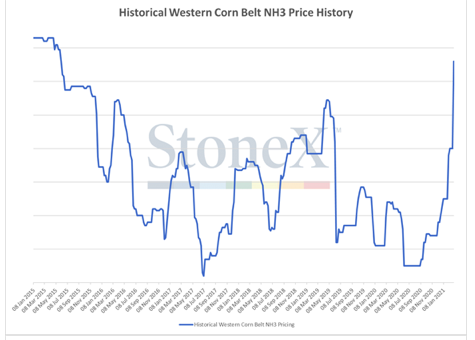
Posted on 11/07/2021 9:27:49 PM PST by yesthatjallen
The world is facing the prospect of a dramatic shortfall in food production as rising energy prices cascade through global agriculture, the CEO of Norwegian fertilizer giant Yara International says.
"I want to say this loud and clear right now, that we risk a very low crop in the next harvest," said Svein Tore Holsether, the CEO and president of the Oslo-based company. "I’m afraid we’re going to have a food crisis."
Speaking to Fortune on the sidelines of the COP26 climate conference in Glasgow, Holsether said that the sharp rise in energy prices this summer and autumn had already resulted in fertilizer prices roughly tripling.
In Europe, the natural-gas benchmark hit an all-time high in September, with the price more than tripling from June to October alone. Yara is a major producer of ammonia, a key ingredient in synthetic fertilizer, which increases crop yields. The process of creating ammonia currently relies on hydropower or natural gas.
"To produce a ton of ammonia last summer was $110," said Holsether. "And now it's $1,000. So it's just incredible."
Food prices have also risen, meaning some farmers can afford more expensive fertilizer. But Holsether argues many smallholder farmers can't afford the higher costs, which will reduce what they can produce and diminish crop sizes. That in turn will hurt food security in vulnerable regions at a time when access to food is already under threat from the COVID-19 pandemic and climate change, including widespread drought.
SNIP
(Excerpt) Read more at finance.yahoo.com ...
Another horseman of the Apocalypse unleashed.

Disease, famine and war - instruments of the globalists depopulation program of genocide.
They’d like us to go hastily so as to decrease the “suplus population”.
Or they offer us bugs as the only viable alternative to starvation.
The US exports food because farmers get subsidies to produce cheaper than elsewhere.
If they are incentivized, most places can produce enough to feed their populace. And probably don't have to depend upon artificial fertilizer to do so.
And, oh by the way, it will probably do a lot to stabilize the countries as well.
The youtube farming channels I watch have brought this up on recent videos. Some of the corn farmers are going to grow other crops next year instead of paying 5x as much for nitrogen next year.
One considered himself lucky to have bought a contract last month for next year’s nitrogen at 3x what he paid for it this past growing season.
Crop rotation with soybeans can reduce the need for nitrogen fertilizer.
Native American’s “three sisters” had great wisdom.
The crop in question to my above reply is corn.
Alex Jones is right again and anyone else who screamed to high heaven about shutting down the whole economy, getting rid of “non essential” workers, increasing the price of goods and forcing a labor shortage because of the injection mandates.
Fools don’t care. They have to collapse America before people realize who Cloward-Piven is.
Very true. Farmer’s are going experience a 40-50% reduction in yield without nitrogen though. Then translate that into the supply/demand outcome and people will be looking at a $10 box of cornflakes in 2023.
They used to do that until it became so attractive to raise corn to produce legal moonshine (ethanol). The corn, which is meant to be eaten, was used to destroy car engines.
Its a completely self-inflicted wound.
In the USA, Nat Gas futures, while higher than lows seen during Covid, are about at their average price of the last 20 years.
Famine is a favorite tool of communists. The Democrats keep cutting energy sources for their mythical green energy only to cause a famine. Typical communists.
Of course we are. THAT is part of the plan. Hey Joe, how much did China pay you to destroy America?
https://www.britannica.com/event/Holodomor
https://twitter.com/i/status/1457599644960129033
How much do you really know about farming and the food supply train? Do you really believe the productivity of American agriculture stems from government subsidies alone? Or that it is easily replicated elsewhere?
Agribusiness is huge and complex. Getting food from the farm to market requires a massive distribution system. During the Great Depression farmers were dumping their milk and other products.
The high price of fertilizer, gas, and equipment will affect production and distribution and the cost of food. If people consume less because of high prices, demand goes down and so will supply. What’s next, price controls?
Disclaimer: Opinions posted on Free Republic are those of the individual posters and do not necessarily represent the opinion of Free Republic or its management. All materials posted herein are protected by copyright law and the exemption for fair use of copyrighted works.